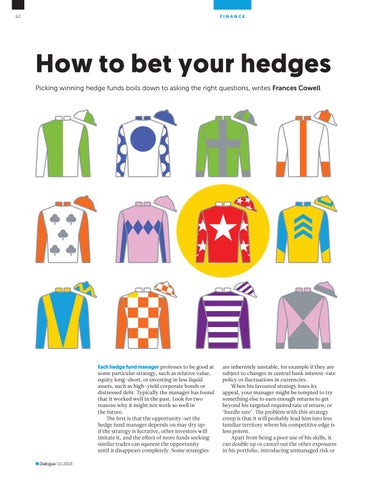finance
62
How to bet your hedges Picking winning hedge funds boils down to asking the right questions, writes Frances Cowell
Each hedge fund manager professes to be good at some particular strategy, such as relative value, equity long-short, or investing in less liquid assets, such as high-yield corporate bonds or distressed debt. Typically the manager has found that it worked well in the past. Look for two reasons why it might not work so well in the future. The first is that the opportunity-set the hedge fund manager depends on may dry up: if the strategy is lucrative, other investors will imitate it, and the effect of more funds seeking similar trades can squeeze the opportunity until it disappears completely. Some strategies
are inherently unstable, for example if they are subject to changes in central bank interest-rate policy or fluctuations in currencies. When his favoured strategy loses its appeal, your manager might be tempted to try something else to earn enough returns to get beyond his targeted required rate of return, or ‘hurdle rate’. The problem with this strategy creep is that it will probably lead him into less familiar territory where his competitive edge is less potent. Apart from being a poor use of his skills, it can double up or cancel out the other exposures in his portfolio, introducing unmanaged risk or
Dialogue Q1 2018
062-063_Dialogue_Q1_2018.indd 62
26/10/2017 15:11
